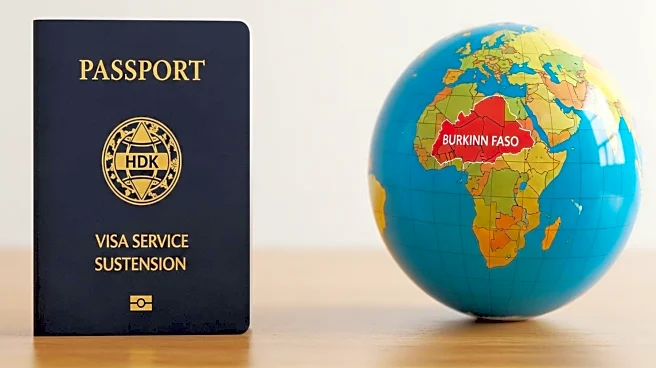What is the story about?
What's Happening?
Burkina Faso has declined a proposal from the Trump administration to accept deportees from the United States. The West African nation was asked to accept non-citizens expelled by the U.S., alongside its own nationals. Foreign Minister Karamoko Jean-Marie Traoré announced the decision on national television, citing the proposal as contrary to the country's values of dignity. This announcement coincided with the U.S. Embassy in Ouagadougou suspending most visa services for Burkina Faso residents, redirecting applications to Togo. The embassy did not provide a reason for this change. Traoré suggested the suspension might be a pressure tactic, emphasizing Burkina Faso's stance as a land of dignity, not deportation. The Trump administration has previously struck agreements with several African nations to accept deportees, a move criticized by rights groups.
Why It's Important?
The refusal by Burkina Faso to accept deportees from the U.S. highlights ongoing international tensions regarding migration policies. This decision could impact diplomatic relations between the two countries, especially in light of the U.S. Embassy's suspension of visa services. The broader implications include potential challenges for the Trump administration's deportation program, which has faced criticism for its secretive nature and alleged financial incentives offered to African nations. The situation underscores the complexities of international migration agreements and the ethical considerations involved in deportation practices.
What's Next?
The suspension of visa services by the U.S. Embassy may lead to further diplomatic discussions or negotiations between Burkina Faso and the United States. The Trump administration might seek alternative countries willing to accept deportees or adjust its approach to international deportation agreements. Additionally, rights groups may continue to protest the program, potentially influencing public opinion and policy decisions. The situation could also prompt other African nations to reconsider their participation in similar agreements.
Beyond the Headlines
The ethical implications of deportation agreements, particularly those involving financial incentives, raise questions about the dignity and rights of individuals being relocated. The refusal by Burkina Faso may inspire other nations to prioritize human rights and dignity over financial or diplomatic pressures. This development could lead to a reevaluation of international migration policies and the role of financial incentives in shaping such agreements.
















